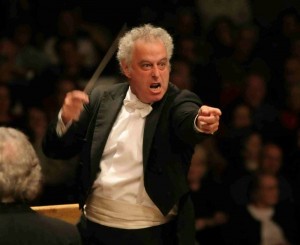
The Glenn Gould Prize, given every three years in honor of (you guessed it) Canadian pianist Glenn Gould, will be given to El Sistema founder Jose Antonio Abreu. The award, to be given on October 27, 2009 (award date is 2008) is for an individual who has displayed altruistic dedication to the spread of music. Previous Laureates include Yehudi Menuhin, Yo-Yo Ma, Pierre Boulez, and Andre Previn.
View Full Article »
Author Archive
El Sistema Founder To Receive Glenn Gould Prize, Dudamel To Receive Mention
LSO Paving The Way For New Classical Labels
Death of autotune, moment of silence
We’ve all heard this one before, the death of the recording label is imminent. But, certain orchestras refuse to go down without a fight. They are proving the point that it is not dying, rather simply changing to meet the needs of a world reliant on consumer electronics to listen to a mere 30 minutes of quality music a day, and tired of recordings where you can hear the electronic clipping of tone filters and amplitude balancing. The 9-5 workday is dead, we have less time than ever, and thus demand only the best quality if we are to spend our morning commute listening to classical music. We are a community of listeners who yearn for the subtleties and energy found in a live performance. To quote HOVA, “this is the death of autotune.. a moment of silence.”
View Full Article »
Another Writer’s Reaction To Criticism Of Conductors
Some still angry

Do you like apples? If you caught my rather sassy rant about Philippa Ibbotson’s recent article “The Myth of the Maestro”, you might enjoy this one. Another Guardian writer has outright disagreed with Ibbotson’s aforementioned piece. Wait, did I say disagree? More like, called her out on it. How about them apples?
In his opening remark of the article “Conductors – the cash and the confusion,” author of the Guardian’s blog On Classical Tom Service agrees with Ibbotson that conductors are overpaid. Immediately after this short-lived agreement, he openly points out the underlying theme of her piece which we all sensed:
I can’t agree with her premise that conductors make no difference to the performances you hear all over the world
View Full Article »
More Bad News From The Met
Bring out Flemming already!

Seems like most news coming from the Met these days is dismal. Yesterday, the New York Post pointed the finger not at Swiss director Luc Bondy and his production team, who were given the sustained booing after the premier of Puccini’s Tosca, but directly at the Peter Gelb, general manager of the Manhattan based organization.
Before anything else, let it be known that this season, all nonunion workers of the Met took a 10% pay cut. So money isn’t exactly flying out the windows this year…
View Full Article »
CUWinds To Feature Works By Stucky
Happy 60th Birthday to Steven Stucky from SoundPostNews!


Enjoy Jeu de Timbres? Need some more Steven Stucky in your life? Well, you’re in luck! On Sunday, October 18 at 3pm, the Cornell Wind Ensembles will be performing two of Stucky’s works: Concerto for Percussion and Wind Ensemble, and Hue and Cry. As an informal birthday tribute to Stucky, the concert may feature some surprises.
Here’s something that should have been thought of years ago. The concert will feature program notes and images projected onto a screen above the ensembles. As Johnston Turner explained to me, “We write these elaborate program notes and then turn out the lights so people can’t read them!” And I couldn’t agree more!
The Concerto for Percussion and Wind Ensemble, was commissioned by ex-students of Donald Hunsberger, as a retirement gift for his nearly forty years as director of the Eastman Wind Ensemble. The piece calls for a massive collection of solo instruments. Timbral groupings represent various movements. For example, the third movement uses only keyboard instruments (glockenspiel, marimba, xylophone), while the fourth places instruments with resonating metallic timbres, such as gongs and Japanese temple bells, against a bass drum. The fourth movement bears the name, “To the victims of September 11, 2001”, a title given after the movement was finished. Taken from Stucky’s personal website:
View Full Article »
Could Montreal pick up where NY left off in Cuba?
Dolla dolla bills y’all

Could the Montreal Symphony Orchestra cash in on the recent turn of events in New York? Arthur Kaptainis, of the Montreal Gazette, is certainly seeing the upside to the cancellation of the New York Philharmonic’s planned trip to Cuba. In case you missed it, Alan Gilbert and the NY Phil (and more specifically the 150 patrons who “donated” their way onto the guest list), cancelled their tour of the US-boycotted country after they were denied their travel permits by the US Treasury Department. Get the full story here
Kaptainis has done all but purchase plane tickets for the MSO to pick up where New York left off. In his article titled “Just picture it: The MSO in sunny Cuba”, he goes into more detail about an idea which he already presented in March of 2008. It seems all too perfect that the Canadian based orchestra is primarily government funded, has an American music director in Kent Nagano, and let’s not forget the fact that in regards to trade relations with Cuba, Canada is second only to the Netherlands.
Did I mention the fact that Canada sends more tourists to Cuba than any other country in the world?
With a three week hold in their schedule mid-winter, it is believable that the MSO could pick up the pieces of a broken puzzle from New York. For the original article, click the link to the Gazette’s online archive.
“Just picture it: The MSO in sunny Cuba”
Guardian Writer Says Conductors Are Overpaid And Not Needed
Several People Not Pleased

A recent article by Phillippa Ibbotson of the Guardian (UK) about the growing salaries of classical conductors has been catching significant buzz. The topic, which has been discussed since before Normal Lebrecht published “The Maestro Myth,” (a book chronicling the shady practices sometimes taken by conductors and their agents to perpetuate ever-increasing salaries), Ibbotson attempts to tackle the issue with what can only be explained as naivety and a lack of facts.
AUTHOR’S DISCLAIMER: In general, I try to avoid sounding upset displeased pissed off angry in my writing. However, after speaking with many of my colleagues, and taking several cool off breaks, I decided to give this article what I feel is a proper response. If you would like to read the original article then hit the link after the jump. Big thanks to the extensive comment thread at the Guardian for some good laughs!
While attempting to compare the conductor to the instrumentalists of an ensemble, Ibbotson’s argument rapidly turns into an attack on the maestro’s importance in a symphony orchestra. What started as the simple question “are conductors overpaid?” quickly turned into “are they even needed?” She even goes as far as to cite Bruce Forsyth’s recent acceptance of a pay-cut as an example for conductors to follow. Yes, that’s the same Forsyth that hosted The Price Is Right and Strictly Come Dancing, the comparison is beyond me. Let’s get right to some of the finer points of Ibbotson’s article:
View Full Article »
Plasson Takes Post with CNSO
Cannot speak Chinese, commences solfege review

French conductor Michel Plasson has been named the music director of the China National Symphony Orchestra. The China National Symphony Orcherstra has been without a conductor since Muhai Tang (now conductor of the Zurich Chamber Orchestra) left the ensemble in 2001. So what’s the big deal?
This act marks the first time a Chinese orchestra has taken on a foreign music director. The CNSO is funded by the Chinese government. Plasson’s French background would make it impossible very difficult to gain approval for a salary, as directorship roles in government funded programs tend to be more than slightly political in origin (China is not the only country who is guilty of this). According to Musical America, Plasson’s paychecks will be taken care of by a private sponsor.
View Full Article »





